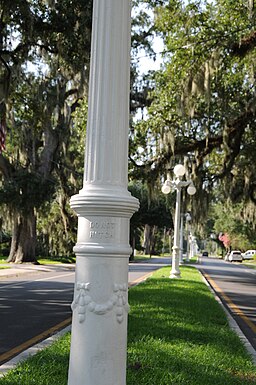Franklin, Louisiana
| Franklin, Louisiana | |
| City | |
|
Historic lampposts lining Franklin's Main Street
|
|
| Country | United States |
|---|---|
| State | Louisiana |
| Parish | St. Mary |
| Elevation | 10 ft (3.0 m) |
| Coordinates | 29°47′30″N 91°30′30″W / 29.79167°N 91.50833°WCoordinates: 29°47′30″N 91°30′30″W / 29.79167°N 91.50833°W |
| Area | 27.2 km2 (10.5 sq mi) |
| - land | 25.7 km2 (9.9 sq mi) |
| - water | 1.5 km2 (0.6 sq mi), 5.51% |
| Population | 7,660 (2010) |
| Density | 298.1/km2 (772.1/sq mi) |
| Incorporated | 1820 |
| Mayor | Raymond Harris, Jr. (No party) |
| Timezone | CST (UTC-6) |
| - summer (DST) | CDT (UTC-5) |
| ZIP code | 70538 |
| Area code | 337 |
|
Location of Louisiana in the United States
|
|
|
Website: www |
|
Franklin is a small city in and the parish seat of St. Mary Parish, Louisiana, United States. The population was 7,660 at the 2010 census. It is part of the Morgan City Micropolitan Statistical Area.
Franklin, named for Benjamin Franklin, was founded in 1808 as Carlin's Settlement, and became the parish seat in 1811. The town was incorporated in 1820. Though early settlers included French, Acadian, German, Danish and Irish, the town's culture and architecture is heavily influenced by the unusually large numbers of English that chose to settle there after the Louisiana Purchase in 1803. Numerous large sugar plantations arose in the area, and with the development of steamboating, Franklin became an interior sugar port. Franklin's First United Methodist Church was established in 1806, making it the first Protestant church established in the state of Louisiana.
By the 1830s, Bayou Teche was the main street of Acadiana, with one plantation after another. The area's sugar cane planters were among the South's wealthiest agriculturists. This is reflected in the grand plantation homes and mansions they built in Franklin and the surrounding countryside. Most of these magnificent structures are still standing and well preserved, giving Franklin its unique architectural flavor. Franklin's Historic District is listed in the National Register of Historic Places and encompasses over 420 notable structures.
During the Civil War, the Battle of Irish Bend, also known as Nerson's Woods, was fought near Franklin on April 14, 1863. Though eventually forced to retreat, the badly outnumbered Confederate forces commanded by General Richard Taylor cost the Union troops, under General Cuvier Grover, significant losses. Four hundred men were killed or wounded in the confrontation, including Confederate Colonel James Reily, a factor in halting the Union drive to invade Texas.
...
Wikipedia



